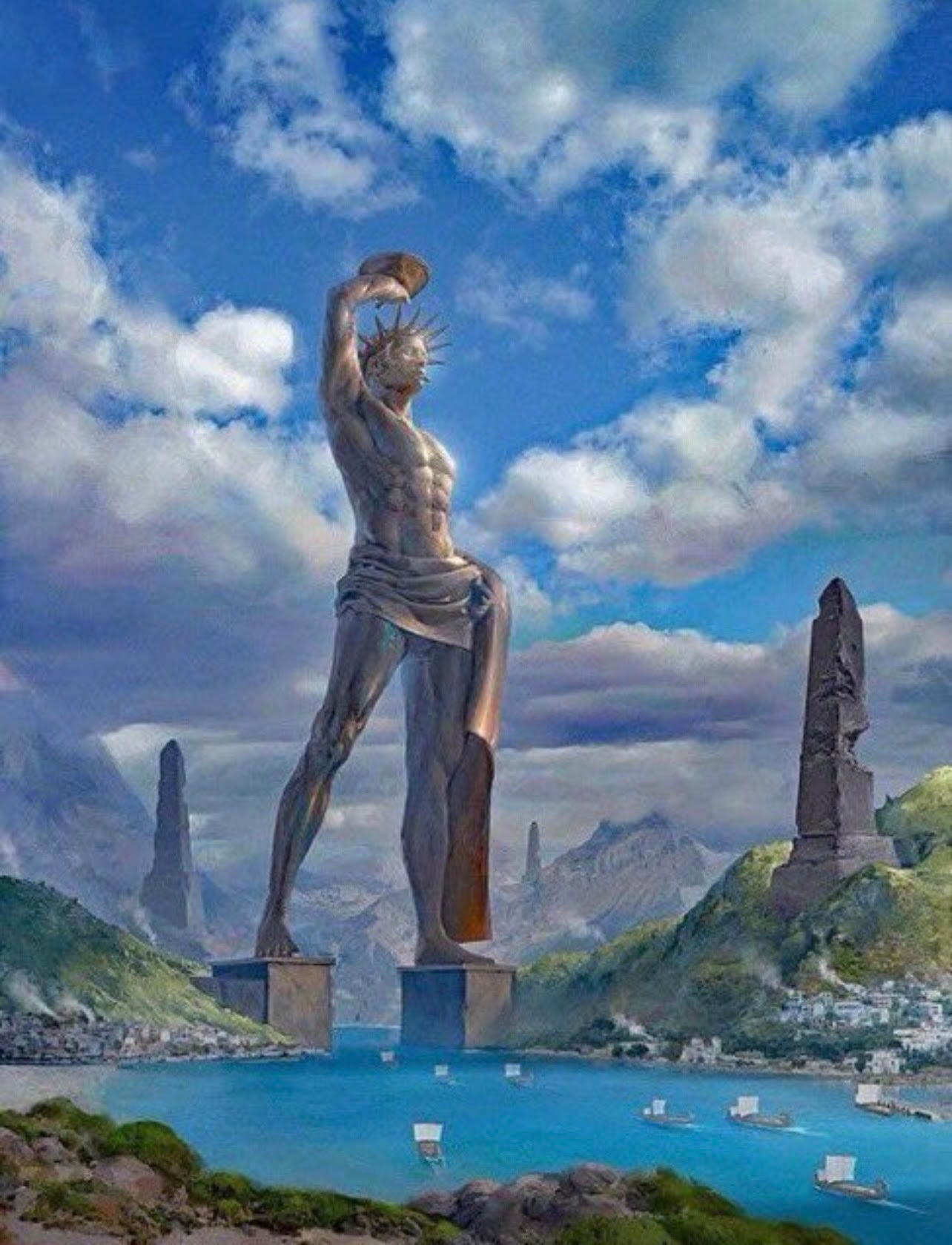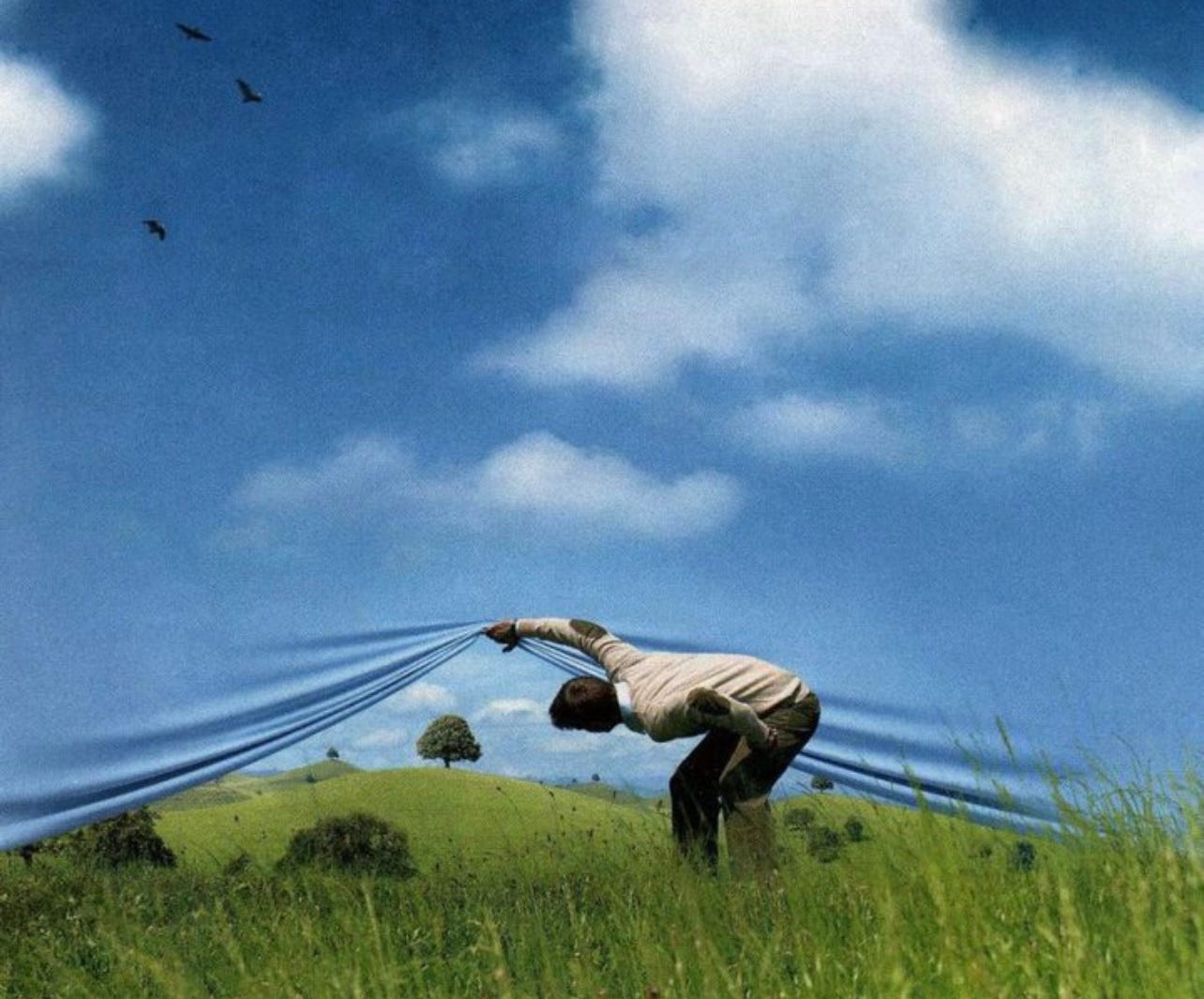The Call to Adventure: In Pursuit of Meaning in Modernity
the newest side quest (hold my beer): finding harmony between man & machine + ushering in a techno-organic-romantic enlightenment
I. The Past: Prompt Engineering at Apollo’s Temple
That pesky Delphic Oracle. In my sophomore year of college, I remember one of my philosophy professors posed a deceptively simple question: what does it mean to know thyself? As a self-appointed math & science nerd with a strong inclination for clearly defined answers derived by equations and proofs, I always scoffed at the mere nebulous “humanities” and never really committed to tackling abstract, open-ended questions. I was uninterested in providing an honest answer and in haste, I thought, well - an assessment of one’s Jungian strengths and weaknesses buttressed by the latest findings in neuroscience should do the trick. I, of course, was quickly admonished for such shallow thinking. “Really ponder it, Tomer,” my professor said.
And with that, I took heed of the advice, changing my mathematical “Go Euclid” hat to my “Who’s this Socrate’s Guy Anyway” beanie (Socrates’ bald head has to stay warm somehow). I realized the true complexity, scale, and difficulty of the question, one wrestled by artists, authors, and scientists since the dawn of time. For the first time, I felt the entire weight of the question - what was in fact an exploration of what it means to be human: of limitations, uncertainty, and boundedness; of desires, hopes and dreams; of life, death, and rebirth; of the human spirit, nature, and our place in the cosmos. And that, one could say, was the birth of my interest in grappling with fancy profound questions, joining my fellow historical scientists of the soul.
That Feeling When your Inner-ChatGPT Gets Hit with the Know-Thyself Prompt
Fast forward a few years later after college, and these types of questions receded from the forefront of my mind, a multi-year low tide. Plato’s transcendental ideals, Russell’s paradoxes and Kant’s critiques of pure reason were replaced by discounted cash flow analysis, 2x2 strategy frameworks, and late night 3am Board presentations. I spent a few years in the belly of the New York high-finance beast doing M&A investment banking, the most competitive and demanding of experiences, and then the next iteration of Jonah’s whale, Silicon Valley, doing corporate development for a high-growth tech software darling.
All these were phenomenal professional experiences, don’t get me wrong. I’ve met some fantastic people and learned a thing or two about Corporate Strategy, Financial Analysis, and Deal Execution which will serve me well in my professional career. But slowly discourse on human nature was replaced by reading market reports, and a shimmering spirit formed into a disciplined, efficient, well-paid cog in the industrial-capitalist machine.
So it was no surprise that something clearly felt missing. Was I, in my mid 20’s, full of vitality and energy, meant to be seeping my daily life force into pretty presentations and office politics? Was this what eudaemonia looked like? Surely not. I discovered these questions were in fact, not simply a question of pragmatic career choices - what start-up I should join, what career I should commit to, or even how I should prioritize personal life & interests with professional pursuits. They originated from a deeper well, a well who’s origin stemmed from the same questions I grappled with back in my college class: meditations on meaning.
What should I do with my life, with my 1x rotations of Uranus around the sun (or maybe a ~0.1x uplift - as they say in finance lingo - if I ardently follow Bryan Johnson’s Blueprint diet)? How should I chart my future course? To take an even broader aperture (to find other things besides myself to potentially blame, most likely), how did the modern world get to where it is today, to a place where it has me fixing logos on a board presentation?1
Live Action Shot of Me, My Pitch Deck, and My Comparable Companies EV / NTM EBITDA Valuation Multiples Analysis during the IBD Dayz
II. The Present: Reflections on The Faustian Age
Now that I’m in my late 20’s soul searching phase, and have a moment of respite from the shackles of the corporate world, we’re back full circle. The musings that started in the classroom continue, albeit in the wild of “adult” life, with a bit more life experience and apartment management know-how. But the question has taken on the same tone as the Delphic one, with a lower pitch one might say, to grapple with the world we live in at large: what does it mean to be human in modernity?
While this sounds like hypothetical contemplations of a curious mind before bed, I believe that these questions are not simply luxuries for the average amateur intellectual (guilty as charged). Rather, in an age of techno-optimism and an adolescent merging of the human spirit with the metallic machines of information & bits, alongside a zeitgeist conducive to the siren songs of nihilism and other potentially misguided ideologies following the relegation of religion to the sidelines, it is paramount to understand our values and purpose to chart humanity’s course in the right direction.
Modernity since let’s say, Descartes’ rationality and reductionist doubt, has taken a detour in the context of a world history seeped in enchantment, both to our benefit as conquerors of the material world - the engine, the lightbulb, industrialization, the Internet, Amazon, the iPhone, you name it - but also to our chagrin, with these developments eliciting potentially existentially destructive side effects - economic fragility, social inequality, political polarity, potential nuclear disaster, rising mental health challenges for the youth, climate change, AI Doom and Gloom, and social media alongside VR unconsciously sculpting our collective conscious.
We have embraced the rise of technology, our embodied extensions, but have we really thought about the implications of our Faustian, industrial, disenchanted, secular, reason-based, atomized, individualized society on ourselves and where we’re going?2
“Where is the life we have lost in living?
Where is the wisdom we have lost in knowledge?
Where is the knowledge we have lost in information?
The cycles of Heaven in twenty centuries
Bring us farther from God and nearer to the Dust.”
- The Rock, T.S. Eliot (1934)
III. The Future: The Techno-Organic-Romantic Enlightenment & Digital Neura-Linking
We live in a world of increasingly accelerating exponential growth driven by the faceless wheels of capitalism (“Moloch” as some of the rationalists call it) and the almost unshakable conviction that science & technology can solve all our problems. In our postmodern pride, we have tossed out the compass of myth & religion that has been carefully passed down through the generations carelessly into the wings, and all this on a stage where the backlights of Judeo-Christian values have been dimmed to their lowest. No wonder the values we’ve been searching for have been hard to find.
We are now beginning to see these inherited historical views cause cracks across political, economic, and social spheres. The hope of this work will be to go one level deeper, past the societal epidermis and at the level of philosophical foundations, to better understand the nature of our problems and solutions. By reflecting on the past, maybe what we’ll find is that instead of relegating the ancient thinkers to “Boomers” with antiquated and stale ideas - they never built the large Hadron Collider, after all - maybe we simply didn’t know how to read the compass and there are indeed some kernels of truth that humanity can leverage as we look toward’s the future.
So here lies the mission before us: can we chart our way to a revised, healthier worldview, a re-enchanted techno-organic society in harmony with nature and others, one that reconciles science and religion, that bridges the past and the present, where humans are put first instead of machines, where the telos of the human spirit is aligned with the underlying process of complexification of nature, where the transcendental ideals of truth, love, beauty reign supreme over power, wealth, and fame? Simple stuff, right?
It may be difficult, near impossible, most definitely naive, but with humility, reason, and openness, hopefully we can make some small progress in the right direction to get to potentially promising, elegant, and historically compatible worldview. It’s one I’m calling the Techno-Organic-Romantic Enlightenment.3 A Renaissance, not a Revolution.
“My Name is Ozymandias, King of Kings;
Look on my Works, ye Mighty, and despair!”
Nothing beside remains. Round the decay
Of that colossal Wreck, boundless and bar”
The lone and level sands stretch far away.”
- Ozymandias, Persey Shelley (1818)
The approach will be to tour the landscapes of mathematics & physics, complexity theory, neuroscience & cognitive science, myth & religion, art, poetry, and literature - from the burrows of the Underground Man to the peaks of Zarathustra’s mountain.4 The modern day digital forager for fruits of insight, if you will. While it may sound like quite the ambitious goal and a classic case of ADHD (at least self-diagnosed per a reading of Gabor Mate’s Scattered Minds), striving for the comprehensive view of the whole, the intentional push to integrate and connect the dots across various disciplines, should hopefully be a worthwhile challenge. As Da Vinci says, everything is connected to everything else.
This will be an exercise in synthesizing work of those smarter than me, building bridges, and applying ideas to the world at large. To give you a taste, modern thinkers such as Karl Friston’s free energy principle bridging math & neuroscience, Jordan Vervaeke’s work on relevance realization & bridging cognitive science and spirituality, Jordan Peterson’s psychological interpretation of the scriptures & myth (but not his politics), Jon Pageau’s brilliant interpretation of the symbolic world of myth & religion, Charles Taylor historical expose in the Secular Age, and Ian McGhilichrist’s left vs. right brain hypothesis alongside a tour of literature - you get the idea.
For historical thinkers, it’s the great philosophers of Western canon built on the foundation of Plato with a desire to further explore neoplatonism and Spinoza’s work. I find the process philosophy of Alfred Whitehead (made digestible by folks like Arthur Young) particularly compelling, which offers a metaphysical framework for the organic and relational nature of process that binds together the Cartesian mind & body tear.5 Essentially, this will be an artistic project in reconciling the right-brained William Blake’s with the left-brained Mandelbrot’s, in the interest of seeing the present & future more clearly. By doing so, hopefully we can cultivate deeper wisdom and unlock human flourishing across all spatial scales - at home, in the local community, and the world at large.
“Philosophy is the product of wonder. The effort after the general characterization of the world around us is the romance of human thought.”
- Alfred N. Whitehead
IV. Concluding Thoughts: The Everyday Life & Sharing the Journey
While wading into the tantalizing waters of theory can be as soothing (and chaotic) as your local Russian banya6, the goal will be to bring ideas back to the original Aristotelian ethos: the tangible art & science of everyday living. As such, this will include a generous creative license, tackling a diversity of topics related to flourishing in the modern world that are hopefully relevant & interesting to readers - topics such as storytelling, leadership, business & investing, culture, technology, mental and physical well-being, & cognitive biases to name a few examples. It will be an iterative process to balance personal anecdotes, creative writing, expositional work, and pragmatic takeaways.
The goal for sharing publicly is to find a few fellow digital travelers upon a similar path, dip our toes in Heraclitus’s river together7, and cook up a few meals of epistemological nourishment. Ultimately, by exploring the world below, around and above us - the very universe the Ancient Sumerians, Egyptians, Greco-Romans, Galileo, Einstein, and that one dude who’s perched up in the mountains of Hawaii at the Keck Observatory on his night shift - looked at, we can deepen the mystery and awe of what it means to be human at this particular kairos, the age of merging between man & machine.
It may be a time of nihilist dusk where the sun of truth that has kept us warm is setting past the horizon, but it is also a time of optimism & opportunity as we can choose how to sculpt the next sunrise of rebirth. What we may find along the way, echoing the words of Carl Sagan, is that we are a way for the cosmos to know, and ultimately love, ourselves and each other.
And with that, the call to adventure begins.
“And you, my father, there on the sad height,
Curse, bless, me now with your fierce tears, I pray.
Do not go gentle into that good night.
Rage, rage against the dying of the light.”
-Dylan Thomas (1951)
In the small case any past or future employers & investors come across this article: this is a slight embellishment for effect - save for that one Saturday night January 1st 6 months into my banking analyst program.
The “Faustian Age” is a moniker coined by the historian Oswald Spengler in his book Decline of the West that refers to the eponymous character in Goethe’s Faust, a man who strikes a a tragic deal (a bi-lateral trade, as they say in the biz) with Mephistopheles (the Devil’s agent / lawyer) to sell his soul in exchange for infinite money, power, and knowledge.
The word of choice Spengler uses to characterize this age is “Infinite” - a time of boundless progress & limitless potential across knowledge aggregation and progress generally but also a time imbued with a sense of potential decline as “Growth at All Costs,” is in fact, costly.
Prior civilization epochs include the Greco-Roman “Apollonian” culture which emphasizes rationality, clarity, and the pursuit of truth through reason and “Magian” culture of Egypt, Islam, and Persia which emphasizes spirituality, mysticism, and religious revelation.
Going backwards - A dash of Goethe’s romanticism, a sprinkle of Whiteheadian process thinking, and a cautious optimism for the gifts that Turing’s computer has bestowed.
Re: References - Hat nod to our friends Dostoevsky and Nietzsche.
A few other captivating up-and-comers that are carrying the torch and doing similar work here include Brett Anderson, Mark Miller, and Matthew Segall.
Looking at you, Russian & Turkish Bath on 10th between 1st and Avenue A.
Heraclitus was a pre-Socratic chap who emphasized the flowing, changing, and dynamic undercurrents of nature vs. his counterpart Parmenides who emphasized the static and unchanging nature of being. The attempted reconciliation between the two ideas still rages on a few thousand years later.









